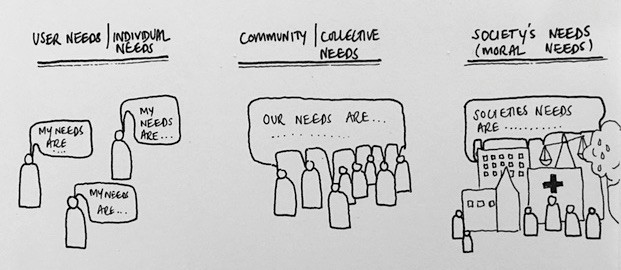Okay folks, I said I’d write something in the follow up post after the workshop myself to encourage others. I’ll link to a editable wiki page, with some resources we found, so others can add to it too. It should be at the bottom of this post.
What was key question you came to the workshop with?
My main questions was one of how well developed the conversation in the Berlin service design scene was when it came to talking about what I see as the existential challenge of our time - the climate crisis.
I wanted to see if we there was sufficient awareness and knowledge to move past the sense of learned helplessness, and abdication of responsibility I see in so many technical communities, where people say “I’m just a designer, I design what the client asks for” or “I’m just a developer, I only buld what I’m told to”.
What was the key takeaway from the day?
My key insight was that while the conversation has a long way to go, and service design as a discipline isn’t as well established as other parts of the world, there’s at least interest, and will to develop it.
While some attendees did get stuck on some exercises when trying to think through stategies to address the problems blocking tangible action, there were enough ideas in the room, to end up with some useful things I could try to help me frame a problem differently.
It was also good to acknowledge that because many of the problems around climate are systemic, the user centred design of many tools we use end up getting in the way of us understanding the problem. I found this piece by Cassie Robinson about the shortcomings of user centred design useful when discussing this during the workshop

I left knowing a bunch of things I didn’t know when I walked into the workshop room.
What do you see as the single largest challenge to designing for climate in industry?
The key challenge I see is people feeling they have the (social) license to talk about the impacts of their work, and not being equipped to have discussions around this.
In my view, so many of the problems related to climate feel like they rely on people being prepared to say “I’m not comfortable with the consequences of doing that”.
I think without people in senior positions create this culture where more junior staff feel supported, I think we’ll end up the sad scenario where people continue to build services that end up pushing us closer to a economic and ecosystem collapse - the difference being that they know how far from sustainable these are, and still build them, but just feel terrible about doing so, rather than changing their behaviour.
With that in mind, I think some of the Consequence Scanning exercises from Doteveryone, are really interesting - while they’re not aimed at climate problems explicitly, they do help us have the same kind of conversations, in a relatively safe structured format.
What single thing would you want to see support available for, to help you with designing services as if we were in a climate emergency?
Support for professionals to develop this knowledge in the form of time for their own study, or an investment in training.
I think this is necessary to help them build the capabilities to make informed decisions about what interventions they make when thinking through and designing services.
If there was one thing you’d ask other practitioners to think about in your field after the workshop, what would it be?
I think the key thing to think about that is just how we mistakenly act like there is no cost to inaction, (the is a very real cost to inaction, and it’s not distant any more), I think the conversations we have with people younger than us will be much, much more awkward if we do nothing than the awkward conversations we might have now towards the end of 2019 with our peers.
We have to get good at talking about climate, and while it’s on us to educate ourselves, we don’t need to wait til we’re experts before we get to have opinions about this what what world we want to spend our professional time building.
I found Mary Louise Heglar’s article, Home is always worth it really good for helping me realise this.